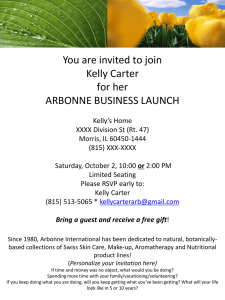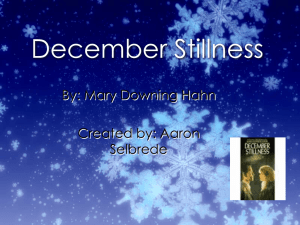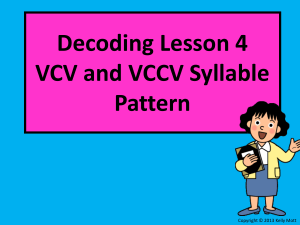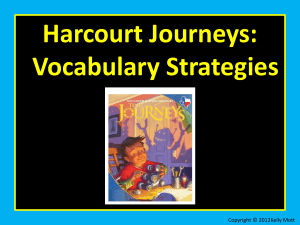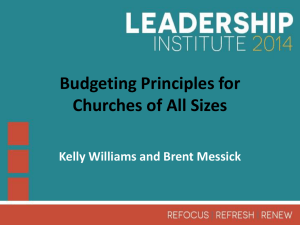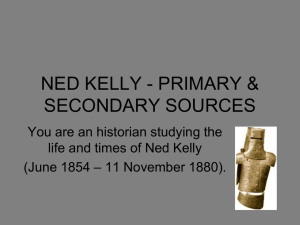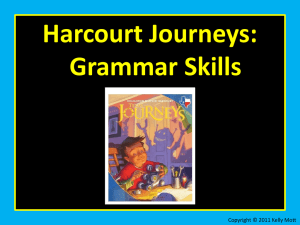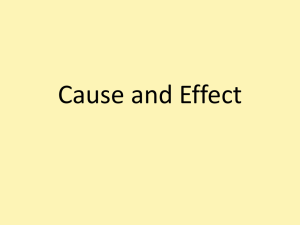Complete Subjects
advertisement
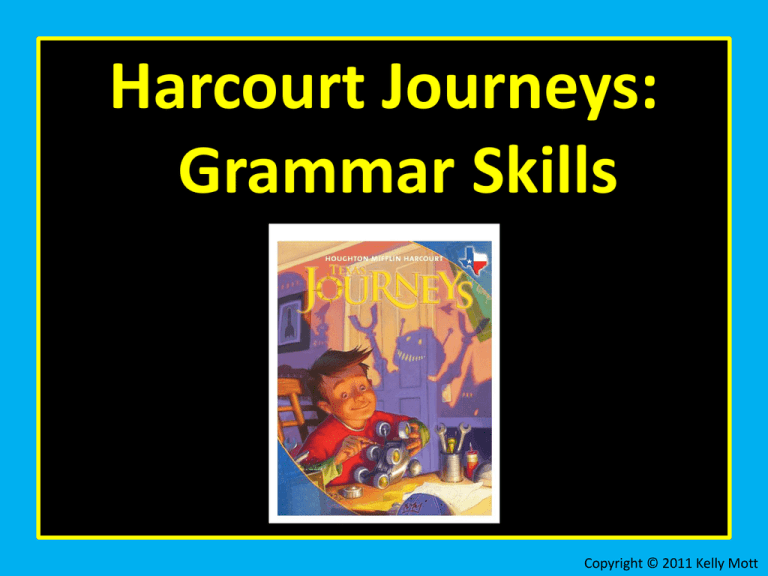
Harcourt Journeys: Grammar Skills Copyright © 2011 Kelly Mott Unit 1: Lesson 2 Copyright © 2011 Kelly Mott This week’s skills: Part 1: Complete Subject Part 2: Complete Predicate Part 3: Compound S & P Part 4: Contractions Part 5: Sentence Fluency Copyright © 2011 Kelly Mott Complete Subject: Part 1: PowerPoint Lesson Part 2: Projectable 2.6 Part 3: Practice Book Page 19 Copyright © 2011 Kelly Mott Part 1: Complete Subject Copyright © 2011 Kelly Mott Click on the link to watch the Brain Pop Video: http://www.brainpop.com/english/grammar/su bjectandpredicate/ Copyright © 2011 Kelly Mott A sentence has parts. Copyright © 2011 Kelly Mott The first part is called the subject. Copyright © 2011 Kelly Mott The 2nd part is called the predicate. Copyright © 2011 Kelly Mott Today, we’re going to focus on the simple subject and complete subject. Copyright © 2011 Kelly Mott The simple subject is the noun that answers who or what in the sentence. Copyright © 2011 Kelly Mott EXAMPLE Copyright © 2011 Kelly Mott Simple Subject The brown, furry dog ate ice cream. Copyright © 2011 Kelly Mott The complete subject includes all of the words that go with the noun. Copyright © 2011 Kelly Mott EXAMPLE Copyright © 2011 Kelly Mott Complete Subject The brown, furry dog ate ice cream. Copyright © 2011 Kelly Mott YOU TRY! Copyright © 2011 Kelly Mott Directions: Circle the simple subject and underline the complete subject. Copyright © 2011 Kelly Mott The friendly dog gave the cat a kiss. Copyright © 2011 Kelly Mott The golden retriever puppies took a snooze. Copyright © 2011 Kelly Mott Baby bear told Mama bear a secret. Copyright © 2011 Kelly Mott Projectable 2.6 Copyright © 2011 Kelly Mott Turn your Practice Book to page 19. Copyright © 2011 Kelly Mott Complete Predicate: Part 1: PowerPoint Lesson Part 2: Projectable 2.7 Part 3: Practice Book Page 20 Copyright © 2011 Kelly Mott Part 2: Complete Predicate Copyright © 2011 Kelly Mott Click on the link to watch the Brain Pop Video: http://www.brainpop.com/english/grammar/su bjectandpredicate/ Copyright © 2011 Kelly Mott A sentence has parts. Copyright © 2011 Kelly Mott The first part is called the subject. Copyright © 2011 Kelly Mott The 2nd part is called the predicate. Copyright © 2011 Kelly Mott Today, we’re going to focus on the simple predicate and complete predicate. Copyright © 2011 Kelly Mott The simple predicate is the verb that tells what the subject is or does. Copyright © 2011 Kelly Mott EXAMPLES Copyright © 2011 Kelly Mott Simple Predicate The brown, furry dog ate ice cream. Copyright © 2011 Kelly Mott Simple Predicate The puppy is cute. Copyright © 2011 Kelly Mott The complete predicate includes all of the words that go with the verb. Copyright © 2011 Kelly Mott EXAMPLE Copyright © 2011 Kelly Mott Simple Predicate The brown, furry dog ate ice cream. Copyright © 2011 Kelly Mott Simple Predicate The puppy is cute. Copyright © 2011 Kelly Mott YOU TRY! Copyright © 2011 Kelly Mott Directions: Circle the simple predicate and underline the complete predicate. Copyright © 2011 Kelly Mott The kitten is curious. Copyright © 2011 Kelly Mott The beagle pup winked at me. Copyright © 2011 Kelly Mott The hamster sleeps quietly in my hand. Copyright © 2011 Kelly Mott Projectable 2.7 Copyright © 2011 Kelly Mott Turn your Practice Book to page 20. Copyright © 2011 Kelly Mott Compound Subject & Predicate: Part 1: PowerPoint Lesson Part 2: Projectable 2.8 Part 3: Practice Book Page 21 Copyright © 2011 Kelly Mott Part 3: Compound Subjects & Predicates Copyright © 2011 Kelly Mott Complete sentences have two parts. Copyright © 2011 Kelly Mott The first part is called the subject. Copyright © 2011 Kelly Mott The 2nd part is called the predicate. Copyright © 2011 Kelly Mott Today, we are going to learn about compound subjects and predicates. Copyright © 2011 Kelly Mott A compound subject has more than one simple subject. Copyright © 2011 Kelly Mott EXAMPLES Copyright © 2011 Kelly Mott Jack and Jill went up the hill. Copyright © 2011 Kelly Mott Joe and Sara run track. Copyright © 2011 Kelly Mott A compound predicate has more than one simple predicate. Copyright © 2011 Kelly Mott EXAMPLES Copyright © 2011 Kelly Mott Eric plays football and swims on the swim team. Copyright © 2011 Kelly Mott Samantha walks her dog and grooms him. Copyright © 2011 Kelly Mott Projectable 2.8 Copyright © 2011 Kelly Mott Turn your Practice Book to page 21. Copyright © 2011 Kelly Mott Contractions: Part 1: PowerPoint Lesson Part 2: Practice Book Page 22 Copyright © 2011 Kelly Mott Part 4: Contractions Copyright © 2011 Kelly Mott Contractions are made by bringing two words together into one. Copyright © 2011 Kelly Mott Letters are removed and an apostrophe is put in their place. can not = can’t Copyright © 2011 Kelly Mott Let’s practice. Tell what contraction word the two words make. Copyright © 2011 Kelly Mott WILL Copyright © 2011 Kelly Mott I will= I’ll Copyright © 2011 Kelly Mott she will= she’ll Copyright © 2011 Kelly Mott he will= he’ll Copyright © 2011 Kelly Mott we will= we’ll Copyright © 2011 Kelly Mott they will= they’ll Copyright © 2011 Kelly Mott HAVE Copyright © 2011 Kelly Mott I have= I’ve Copyright © 2011 Kelly Mott we have= we’ve Copyright © 2011 Kelly Mott they have= they’ve Copyright © 2011 Kelly Mott should have= should’ve Copyright © 2011 Kelly Mott would have= would’ve Copyright © 2011 Kelly Mott HAS Copyright © 2011 Kelly Mott she has= she’s Copyright © 2011 Kelly Mott he has= he’s Copyright © 2011 Kelly Mott WOULD Copyright © 2011 Kelly Mott I would= I’d Copyright © 2011 Kelly Mott he would= he’d Copyright © 2011 Kelly Mott she would= she’d Copyright © 2011 Kelly Mott we would= we’d Copyright © 2011 Kelly Mott they would= they’d Copyright © 2011 Kelly Mott AM Copyright © 2011 Kelly Mott I am= I’m Copyright © 2011 Kelly Mott Click on the link to watch the Brain Pop Video: http://www.brainpop.com/english/grammar/co ntractions/ Copyright © 2011 Kelly Mott Click on the link to watch the Brain Pop Jr. Video: http://www.brainpopjr.com/readingandwriting/ word/contractions/ Copyright © 2011 Kelly Mott Turn your Practice Book to page 22. Copyright © 2011 Kelly Mott Sentence Fluency: Part 1: PowerPoint Lesson Part 2: Practice Book Page 23 Copyright © 2011 Kelly Mott Part 6: Sentence Fluency Copyright © 2011 Kelly Mott One way to make sentences more interesting is to make them different lengths. Copyright © 2011 Kelly Mott Compound sentences are 1 way we can make our writing interesting. Copyright © 2011 Kelly Mott A compound sentence is two sentences combined into 1.. Copyright © 2011 Kelly Mott You can combine sentences using connecting words like: but and or Copyright © 2011 Kelly Mott Today we are going to combine sentences by combining the subjects. Copyright © 2011 Kelly Mott HERE’S A QUICK TIP: Copyright © 2011 Kelly Mott Cross out what’s the same. Then put the rest together. Copyright © 2011 Kelly Mott YOU TRY! Copyright © 2011 Kelly Mott Directions: Combine the subject to make one sentence. 1. Joey plays baseball. 2. Samantha plays baseball. New Sentence: __________________________________________________ __________________________________________________ __________________________________________________ Copyright © 2011 Kelly Mott Turn your Practice Book to page 23. Copyright © 2011 Kelly Mott How did you do? Copyright © 2011 Kelly Mott Copyright © 2011 Kelly Mott
